In November 2017, I went to Japan and visited three schools: Toyota Higashi Kindergarten, Ryunan Elementary School, and Nemunoki Gakuen (school for people with special needs). It was an eye-opener.
In Japan, teaching children to scrub floors goes hand in hand with coaching them how to read and write. Every child must bring a rag cloth to school every day to wipe their own spills and clean up their mess. Schools in Japan do not employ cleaners; the Japanese believe the act of cleaning is an act of purifying oneself. This habit is so important to them, they deem it best to train their children early on.
Since cleaning and tidying up is so ingrained at a young age, it is not a problem to serve food and drinks in class. In fact, this is exactly what happens in school. Children take turns to bring in food from the school kitchen and serve everyone. If a child feels that the portion served is too much for him, he will pour the extra into a special container before he starts eating so it does not go to waste.
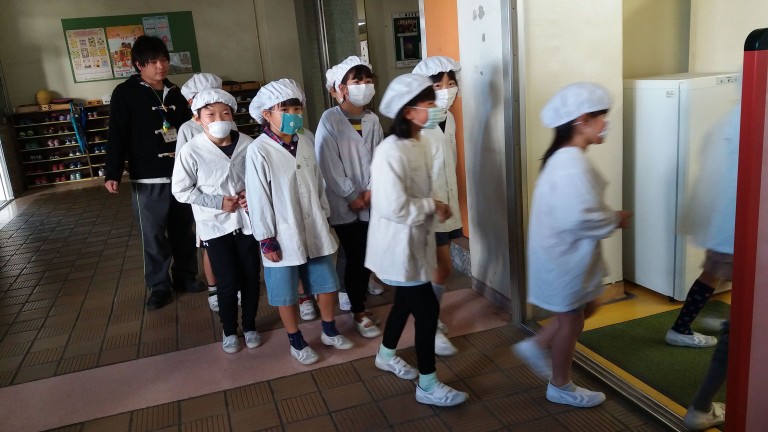
These children wear masks not because they are unwell. They are about to enter the school kitchen to grab lunch and serve it to everyone in class.
Toilets in school are as clean and dry as could be. To enter a toilet, you need to leave your footwear at the door, put on the toilet slippers, and on your way out, return the toilet slippers neatly back in place. Here is a lesson for us parents who are perpetually waging a battle against disarray in homes, schools, and cars, including yours truly. Start your kids to do housework as soon as possible so it becomes second nature to them. Could those of us who struggle daily with getting our homes and offices organized and free of clutter do better with Japanese upbringing? Quite likely.
Cleaning is big not just in school, but within the community, too. One school I went to reported that about two hundred parents came during their recent annual initiative to clean up the school. You rarely see things piled up, even in front of homes. I get the impression rubbish is cleared almost as quickly as they come.
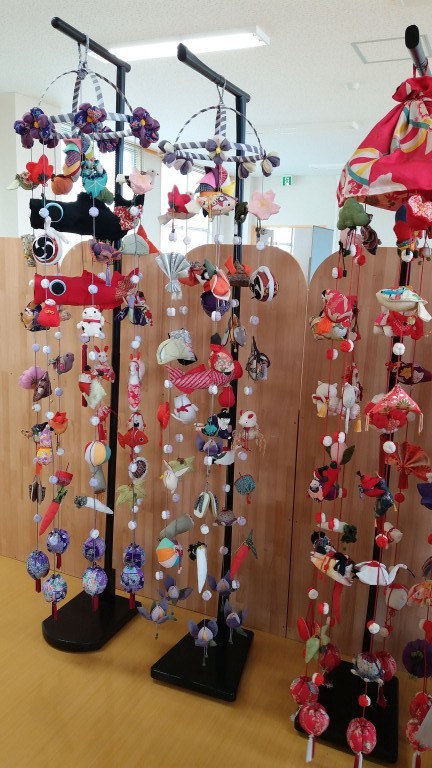
Pretty mobiles created from recycled materials.
Clean drains and rivers are very much part of Japan, too. I have seen how in some countries, people are super sensitive to keep their homes clean, but the roads, drains and public spaces tell a different story. The drains and rivers I passed by in Japan contain little else but flowing water, testimony to the fact that the Japanese treasure cleanliness and do not like to throw rubbish indiscriminately.
My trips to Japan have been far and few between, but what I observed is quite consistent. The Japanese people are world famous as disciplined, organized, and respectful. All it takes is one visit to notice the swept pavements and daintily arranged odds and ends in grocery stores.
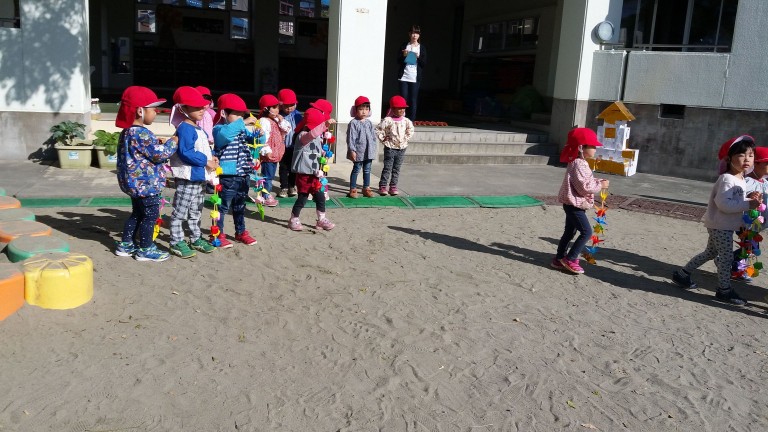
Students take turns to present their origami handiwork to guests at a kindergarten.
Space is very much a constraint in cities, but somehow, the Japanese seem to thrive in such living conditions. If you love order, attention to detail, immaculate spaces and precision, Japan is the place for you.
Precision. Take a 40-person bus ride and watch the driver navigate narrow alleys between building blocks seemingly effortlessly. The driver knows exactly when to turn the steering wheel to avoid hitting dirt, dangling cables, poles, pedestrians and trees. One could be forgiven to think he could do it blind-folded.
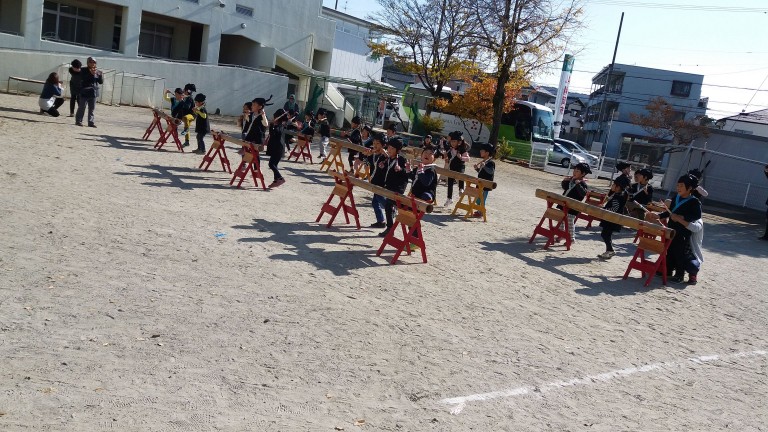
What is in a bamboo? Plenty. Apart from being a delicious source of food, bamboo makes fine musical instruments.

Part of the syllabus in this school is to visit a rice farm, learn all about rice production, and bring some produce back to school to cook and eat together.
Punctuality. If a shinkansen (bullet train) misses the mark by two minutes, you’ll see the announcement on display. Time is of the essence. It goes to prove how time conscious the Japanese are; they know full well that a little delay might hold up a lot of lineups.
Love For Order. Despite space constraint, you do not see clutter in restaurants that are a fraction of the size of outlets in Malaysia. I’m perplexed how a clearly tiny restaurant could fit in so many customers. The employees know what to get, how, when, and where, even when it is stowed in a hidden corner somewhere.
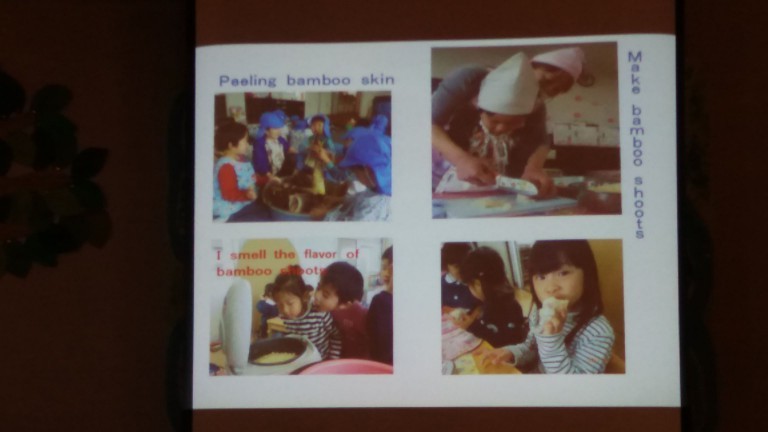
Children in a kindergarten learn to value bamboo as a natural resource not just in theory. They visit bamboo farms and learn how to cook bamboo shoots.
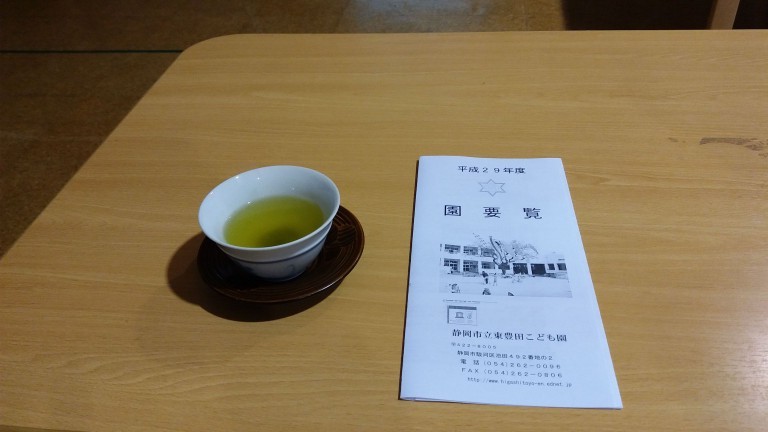
My fellow travellers and I were welcomed with tea while listening to a presentation by a senior teacher.
Attention To Detail. How else can you explain the presence of an infant seat, cane hanger, child potty seat, complete with seat warmer and bidet in a spotless toilet cubicle? A lady who used to work as a toilet cleaner in Japan said, “I once asked my colleague, a Japanese woman, why she was scrubbing the toilet so much despite it being spotless. She said, ‘It’s a matter of responsibility.’” In Japan, responsibility is not taken lightly.
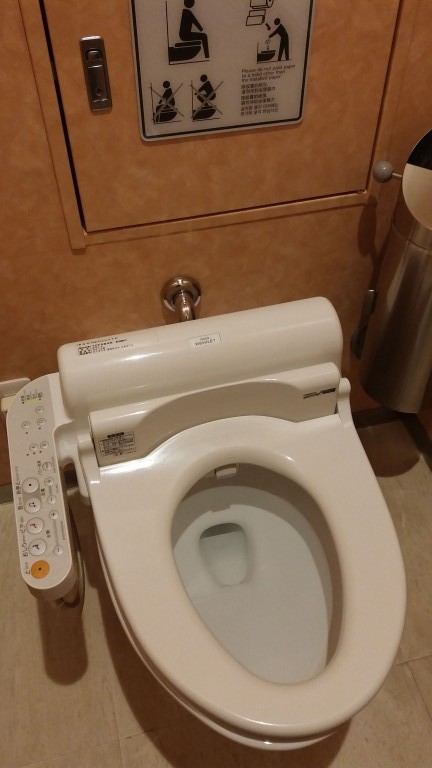
You can choose the strength of the water spray to clean yourself.
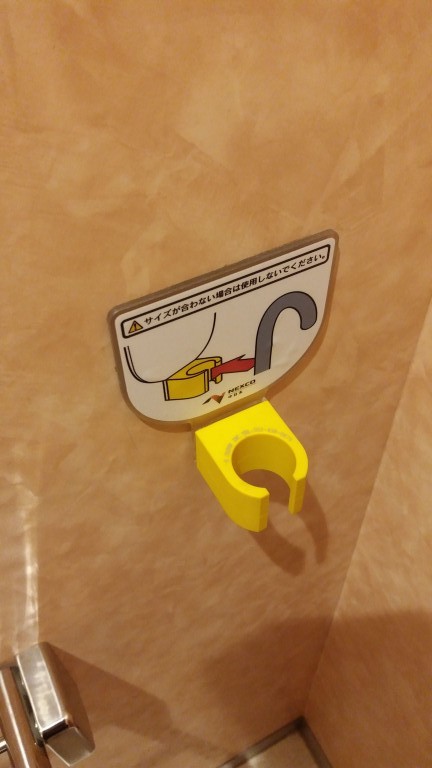
A little corner to hang your cane if you use one.
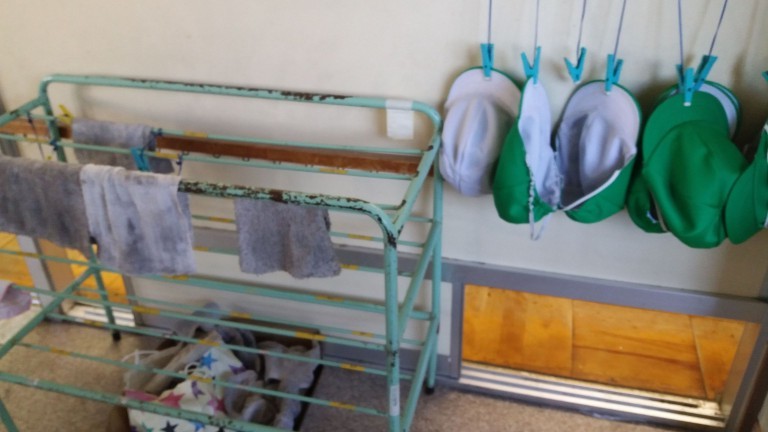
This is not a janitor’s room. The students hang their damp rag cloths here to dry.

Seeing is believing. The Japanese love for order is evident for all to see.
Strong Community Spirit. The Japanese cherish their natural resources. The community and the school work closely together to encourage appreciation of natural resources in school early. In one of the schools I visited, the children learn to grow these plants, how and when to harvest them, the different uses of bamboo, benefits of tea and how to prepare and serve them. They even did a performance for us using instruments made of bamboo.
Early Independence. Primary school children ride the train by themselves. In fact, they are taught to start going to the local grocery store earlier than that. Perhaps this has something to do with the country’s experience with natural disasters like tsunamis and earthquakes. The earlier children are taught to take care of themselves, to be able to think on their feet wherever they are, and not to panic, the better and safer they become.
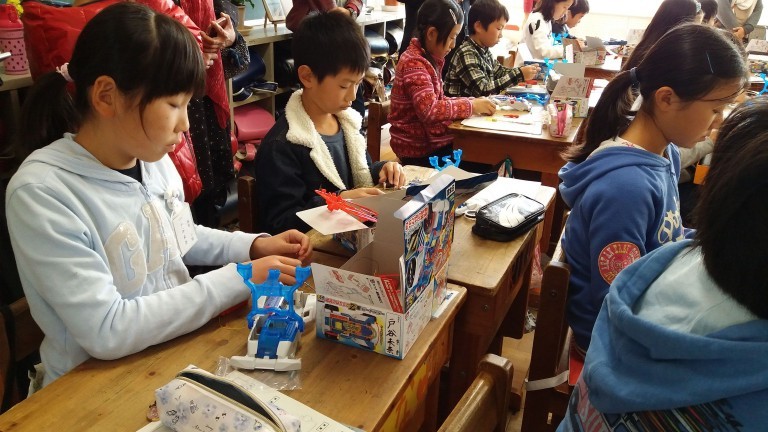
Back to basic hands-on learning.
Conformity. This is something I’m still struggling to understand. The Japanese value hard work and achievement, yet at the same time, a person who does not conform to the majority is likely to be an outcast. I sensed that uniqueness – to be different – is not something to go for.
Taking Care Of The Environment. At school children dispose of recyclable materials like milk cartons in a systematic way to ensure they do not pollute the environment. They know it is pointless to throw away rubbish at someone else’s backyard. Sooner or later it will come back to you.
Special Needs. I had the opportunity to visit a centre where autistic adults live and work. The men who have been certified as highly functioning are gainfully employed by a company.
Reflections On Japan
As I write this, next to me sit two origami necklaces. One of paper cranes, the other of paper cubes, one as colourful as the other, with a yellow string and pink straw running through them. The necklaces are gifts from the students of a Japanese school I visited together with fellow travelers.
The first time I set foot in Japan many years ago, I saw a man and a Japanese woman having a verbal exchange not far from where I stood. The man’s voice was loud enough for anyone in the vicinity to hear. I might have been mistaken but the man did seem upset, judging from his tone. I looked with amazement as the lady bowed to say “Hai!” over and over again. She did not appear to be the least bit disconcerted by the man’s demeanour. I could not help wondering how someone could swallow what appeared to be unacceptable behavior to me, especially in a place so public.
After the devastation of World War II, Japan rose above the ashes to hit the mark in terms of recovering as a nation. It is no small feat to pull together a country that was in ruins. Perhaps being homogeneous helps; plus what choices did they have back then? Either they pull through the turmoil or perish together.
My visits to Japan thus far have been short and sweet. I love Japan, the gentle and respectful people who speak with a soft lilt that sound like music to the ears. No doubt we can learn a lot from how the Japanese raise their young. Yet, the high suicide cases reported each year in Japan, especially among youth below the age of 18 is troubling. Suicide is cited to be the leading cause of death among children in Japan[1]. The pressure to fit in and perform is tremendous. The phenomenon of social withdrawal, where adolescents stop attending school and isolate themselves for years is also a matter of concern[2]. Some experts think it has something to do with the hara-kiri tradition, that suicide is an honourable way to take responsibility over how one’s life has turned out.
Overly High Stress Leads To Depression & Suicide
For a person who is depressed, solid family support can make all the difference. Might it mean that the children and youth who resorted to ending their lives did not feel it safe enough to talk about their problems? If parents know how to engage, and connect with, their children, and to convince their children of the sanctity of life, and equally important, present options, things could be different. If teachers are trained to acknowledge and guide troubled children and youths, perhaps those who are contemplating suicide might see light at the end of the tunnel. Some problems do not disappear just because you refuse to talk about them; they grow bigger.
Believe in God & Ultimate Justice
The absence of belief in a Higher Being is missing in many Japanese families. If you believe with conviction that life on earth is temporary, that the troubles you face is finite, that God will take care of things, that you only see the pixels but God is Just and with His Absolute Wisdom knows everything and things will work out one day, if not in this world, then the next, your perceptions, values and views about life’s pleasures and pains will be different.
Strike A Balance
It is important to strike a balance between honouring the needs of the individual, family, community and nation. In Japan, it appears to me that the needs of the community and the nation seem to be given a priority above and beyond the needs of the individual and the family, not a sustainable solution in the longer term. We must decide the kind of success we want and the price that comes with it. A nation can still achieve socio-economic success while inculcating a better balance. Germany, for example, is a country that has achieved remarkable economic success, yet makes it a point to not sacrifice family rights.
Striking a work-life balance is elusive in Japan; you’re not supposed to leave work before your boss does. In general, the Japanese are committed to deliver and have a reputation of working long hours. Coming home late is the norm. Fathers hardly get to see their children. Women are expected to quit their jobs and take the hot seat to raise their young. A possible explanation why the Total Fertility Rate (TFR) in Japan has fallen to dangerously low levels. Japan is an aging society; elderly people continue to rise in numbers but less babies are born each year. For a Japanese woman who firmly believes in father presence, that parenting is best done together with a man, having to raise a family almost all by herself is not something to look forward to. If current birth rates in Japan persists, the nation is forecasted to cease to exist by 12 August 3776 [3]. If this happens, it would be a tragedy, a huge loss to the entire world as Japan has so many positive values and practices we can avail of.
References
[1] http://www.newsweek.com/why-do-so-many-japanese-schoolchildren-kill-themselves-391648 [2] https://www.japantimes.co.jp/news/2017/01/25/national/social-issues/japans-middle-aged-recluses-dire-need-help-survey-finds/#.WqXw2JNuaT8 [3] http://www.businessinsider.my/signs-japan-demographic-time-bomb-2017-3/?r=US&IR=T








